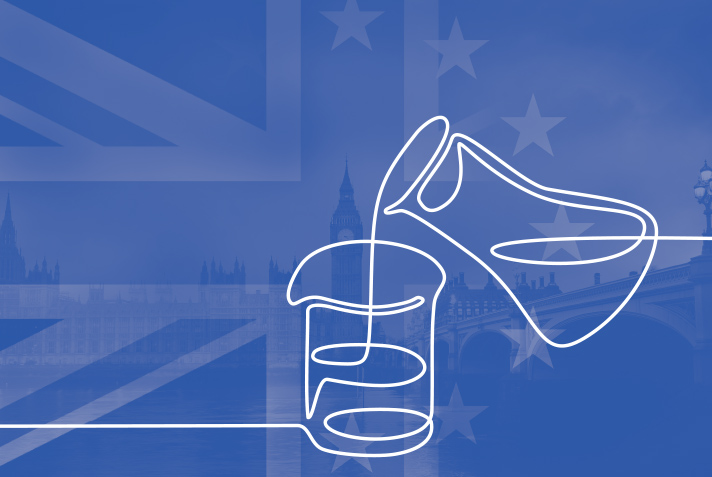Since March 2017, when the UK invoked Article 50 to exit the EU, little else has been discussed by Government and policy makers. Whilst Government policy states that a no deal scenario (with no single market type agreement, and no transitional period) remains unlikely given the mutual interests in securing a negotiated deal, it advises that it is its duty as a responsible Government to prepare for all eventualities. Increasingly the prospects of a no-deal Brexit after 29 March 2019 are being considered.
Chemicals regulation after the UK has left the EU was the subject of a recent one-off session of the House of Commons Environmental Audit Committee (EAC). The panel considered questions including whether the UK’s participation in Regulation, Evaluation, Authorisation and Restriction of Chemicals (REACH) will continue seamlessly during the transition period, the challenges of a no deal Brexit, (which industry witnesses said would be ‘catastrophic’), and what still needs to be addressed.
The lack of detail in the Government’s September technical notice on ‘regulating chemicals (REACH) if there’s no Brexit deal’ was discussed as a key concern for industry. Whilst the Health and Safety Executive’s (HSE) ‘additional no deal REACH guidance’ has since fleshed out some of the detail on actions which businesses should take to maintain or gain access to EU/EEA markets, industry still has concerns around how this will work in practice, and how a no deal Brexit would impact the competitiveness of the UK chemicals industry.
One factor is the additional regulatory burden, including increased administration and cost, imposed by the requirement to register or re-register chemical substances under UK REACH in a no deal scenario. There are many aspects to this. Many companies have never had to think about REACH before, as they have simply been moving around a European product which has already been registered by someone else in their supply chain. Another concern is that UK companies using high-value, low volume substances may find that registration for UK REACH (particularly the data access costs), based on UK tonnages alone, is not economically viable for what may be a small market. Will some UK manufacturers consider moving their plant to the EU, so as to ensure more immediate access to larger markets and one set of regulatory obligations? Will their EEA customers decide to source their chemicals from suppliers in the EU-27 post Brexit, rather than taking on the EU REACH registration obligation themselves? Also, it is not yet clear how companies manufacturing/importing the same substances in/into the UK will adhere to the principle of one registration one substance, share data costs and minimise animal testing. The HSE’s Additional guidance suggests early contact with members of the relevant SIEF (Substance Information Exchange Forum), however this is unlikely to be straightforward, as under EU REACH, SIEFs were only operational until 1 July 2018 – the last REACH registration deadline.
Panellists also observed that the potential cost of registrations/re-registrations for UK REACH in a no deal Brexit is likely to be significant, estimated at £450million on top of the £550 million already invested by businesses. This assumes that data access costs will need to be replicated, since existing data access agreements typically limit use to EU REACH. Fundamentally, data access for UK REACH will be a matter of commercial negotiation around whether data owners are prepared to share the data (and there may be reluctance for competition-related reasons), and if so, on what terms, including cost. If negotiation is unsuccessful, repeat testing will be necessary, with a potentially significant impact on animal testing. In September, the Government’s technical notice gave a 2 year timescale for UK REACH registrants to submit a full dataset. However, the HSE has since indicated, in its ‘additional no deal REACH guidance’ that this 2 year period will be kept under review, possibly a tacit acknowledgement that it’s an unrealistic timescale.
Regulatory divergence following Brexit is another significant concern for the sector, which sees alignment with EU law as critical to maintaining access to the EU market. Following a no deal Brexit, UK companies could potentially have to comply with two sets of law: EU law for any product exported to the EU, and UK law for the UK market, incurring additional cost which could make them less competitive. In its September Technical Notice on no deal, the Government confirmed that the UK is committed to maintaining environmental standards after Brexit, however – divergence from EU law remains a risk.
So far as the proposed deal is concerned, it addresses one of the chemical industry’s priorities: regulatory consistency. During the transition period, there would be regulatory alignment, but with no participation by UK representatives or experts in any meetings of the European Chemicals Agency (ECHA), (other than ‘exceptionally’ if one of two specified conditions is fulfilled) and no voting rights. The UK HSE will cease to be a Competent Authority for the evaluation of substances under REACH (unlike regulators in Norway and other EEA countries). As a result, the UK will follow whatever is enacted at EU level, but with no opportunity to input or to influence. At the end of the transition period, the path forward will depend upon what is agreed as part of a future trading relationship. Even if the transition period is agreed, the future remains uncertain.
Questions remain as to how prepared the Government actually is for a no deal Brexit. Panellists at the EAC session queried the capability of HSE to take on additional responsibilities in a no deal scenario, in terms of resource (ECHA has 500 employees), training and access to expertise. In addition to its significant role in relation to UK REACH, HSE is in the frame to replace ECHA in relation to CLP (Classification, Labelling and Packaging Regulation), PIC (Prior Informed Consent Regulation), and the evaluation of active substances under the biocides regime. It will also take on the work currently carried out by ECHA’s expert committees, such as the Committees on Risk Analysis, Socio- Economic Assessment and Biocidal Products.
Other questions concern the status of the UK REACH IT system (on which £5.8 million is reported to have been spent). HSE has confirmed in its ‘additional no deal REACH guidance’ that this system, mirroring EU REACH IT, which is being built for registrations and notifications will be operable from 29 March 2019. The plan is for it to replicate the same functionalities as EU REACH IT, allowing the software application IUCLID to be used ‘so that the same dossiers can be uploaded to UK REACH-IT’. But what exactly will UK REACH IT comprise? The current view from industry is that it will have only a basic functionality on Brexit and it is not yet known whether it will deliver any sort of system for CLP and if there will be a separate system for biocides.
The reality of a no deal Brexit is that the UK would be locked out of the ECHA database, which cannot be simply downloaded or replicated due to intellectual property issues. The database includes details of over 21,000 individual chemicals registered under REACH, including information on their physical and chemical properties and guidance for safe use. Even if the information is publicly available, (and some information is withheld on grounds of confidentiality), the legal notice on the ECHA website is very clear that the ECHA Portal, the database and the software must not be copied or commercially used without the prior written consent of ECHA. This is in addition to the data protection rights held by third parties in relation to the data itself.
In light of these concerns, a significant aspect of the proposed Brexit deal for the chemical industry is ongoing full access to the ECHA database throughout the transition period. Looking further ahead, the industry is encouraged by the reference to possible future cooperation with ECHA in the Political Declaration. The Government’s preferred approach is a form of associate membership of ECHA which could include a licence to use the ECHA database, access to EU REACH IT, the ability to register chemical substances directly with ECHA and contribution of expertise (but without voting rights). This would come at a price, but in the industry’s view, well worthwhile to maintain frictionless trade and to avoid the UK trying to replicate a system which is seen as the benchmark for global chemicals regulation.
In the meantime, as Government ramps up its preparations for no deal, the industry continues to flag concerns such as the risk of ‘just-in-time’ chemicals (including chemicals for key sectors such as water and energy) getting caught in border chaos. It urges Government to step up its engagement with industry, with events which are widely accessible and include more workshops and webinars. The industry is also looking for reassurance that Government is listening to the concerns raised, to avoid what was described at the EAC session as “a long, slow puncture of the chemicals industry”.
For more information, please contact:
Elizabeth Shepherd, Partner, Eversheds Sutherland
T: +44 161 831 8215
M: +44 786 079 6884
elizabethshepherd@eversheds-sutherland.com










